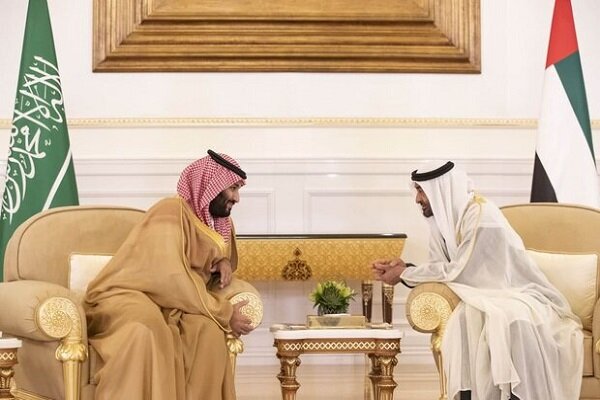MBS angers MBZ

TEHRAN – In the latest blow to the United Arab Emirates, Saudi King Salman bin Abdulaziz received Sultan Haitham bin Tariq of Oman for the first time since the outbreak of the coronavirus pandemic, which has put an end to the aging king’s in-person meetings with foreign leaders.
King Salman bypassed the corona-related health protocols by receiving the sultan of Oman, indicating the importance of the meeting between the leaders of the two neighbors whose relations had never gone beyond usual diplomatic compliments and expressions of sympathy in times of difficulty. Saudi Crown Prince Mohammad bin Salman also made sure to underline the importance of bin Tariq’s visit by removing the mask he was wearing during receiving the sultan. When he noticed that the Omani leader wasn’t wearing a mask upon his arrival at Neom Airport, he quickly moved to take off his mask to imply how welcomed was bin Tariq whose visit to Saudi Arabia was the first since assuming office more than a year ago.
During the visit, Oman and Saudi Arabia established a joint coordination council to follow up on issues of common interest. The visit coincided with the completion of a 680 km-long road linking Oman to Saudi Arabia and offering the latter an alternate route to bypass the UAE which served for a long time as a transit link between Saudi Arabia and Oman.
These developments were not lost on Abu Dhabi Crown Prince Mohammad bin Zayed, who is going through a quiet crisis with his old friend bin Salman, who, in turn, has widely been seen as a protégé of bin Zayed. Many in the region and beyond believe that bin Salman's ascension to the throne was facilitated by bin Zayed. This perception of patronage continued to characterize the relations between Riyadh and Abu Dhabi over the past few years.
But the relations between the two powerful men began to crack in recent days, with several media outlets reporting that the two crown princes started to part ways especially in terms of economic relations.
The nascent disagreements between MBS and MBZ were so obvious that even the cagy and tight-lipped Emiratis acknowledged them. “History testifies that economic differences sometimes occur, but they do not create breakdown, because there is an understanding that the interests that bind the two countries are greater than any difference in viewpoints,” Salem al-Katbi, a prominent Emirati columnist, admittedly wrote in an opinion piece for Al-Arab newspaper.
The gap between the two ambitious men of the region first came to the surface when the Saudis called for an eight-month extension of an OPEC+ production cut deal, only to see the Emiratis beseech them to exempt the UAE from cutting production.
Then the two countries issued travel bans on each other’s subjects to seemingly prevent an outbreak of the coronavirus. The tit-for-tat move further inflamed speculations about a rift between the two. This was exacerbated by a Saudi decision to force multinational international firms to move their regional office to Saudi Arabia if they want to do business in the Arab country. The move was seen by many analysts, and Emiratis, as a plan to target Dubai as it stands to be almost the only business hub in the region that plays host to many international firms’ regional offices.
Where these disagreements would lead remains an open question. Some observers believe that MBZ will move to reign in his onetime disciple and make him understand that harming the interests of the UAE has a price tag.
Bin Zayed “will seek to explain to his Saudi counterpart that the price of disagreement with him will be high, and that his dependence on the Emirates was so great that he risks his downfall if he abandons it, and that Saudi Arabia is too weak to threaten the Emirates, even though it is a large country. He has in mind the example of Qatar, which Riyadh lost to it, although it was supported by the Emirates, Egypt and Bahrain,” wrote Hussein Ibrahim, an analyst, in an opinion piece for Al-Akhbar newspaper.
“Bin Zayed could go further in his quest to get Bin Salman back into the fold,” Ibrahim continued, adding, “He will tout himself to the Americans as the key player in lowering oil prices from the high levels they recently reached, a major point of contention that emerged with the outbreak of the crisis between the two countries, after the UAE tried to evade commitment to its production quota in OPEC.”
Leave a Comment